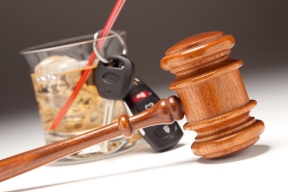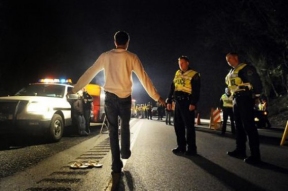
Illinois has strict drunk driving laws. Despite these laws, 41 percent of people killed in vehicle crashes in Illinois involve drunk drivers. Between 2003 and 2012, the number of deaths involving drunk drivers reached 3,866 in Illinois alone. Fortunately, that number continues to decrease, partially because of laws that include severe punishment for driving under the influence (DUI).
The number of drivers arrested for DUI is extremely high in Illinois. Each year, over 37,000 people are arrested for driving under the influence of alcohol or narcotics. DUI arrests begin in multiple of ways. A police officer can stop a vehicle because the driver violated a moving violation, such as disobeying a stop sign. A state trooper can conduct a sobriety checkpoint and stop each vehicle passing by a particular location. (Yes, this legal in Illinois) A driver may pull over to the side of the road to “sleep it off.” However, if the driver keeps the keys in the ignition, the police officer can arrest the driver. A coalition also can begin a chain of events leading to an arrest for DUI.
Once a driver is detained, a police officer can require proof of a valid driver’s license and insurance. If suspicion exists of impaired driving due to alcohol or drugs, the officer can request field sobriety tests. These may include a test known as “walk and turn” and a one-legged stand, among others. If the officer then believes the driver is impaired, the officer can arrest the driver for DUI. A DUI arrest does not require that a driver take a breathalyzer test and blow over 0.08 percent of alcohol. A DUI arrest can occur with or without the breathalyzer test. Once a person is arrested for DUI, the person’s driver’s license will be automatically suspended for a period of time.

The license suspension can be challenged in court. However, a specific and short timeframe exists in which to challenge that suspension. License suspension is a civil matter and can occur even if a driver is never convicted of the underlying DUI charge. This is just one very important reason to seek legal counsel for a DUI.
What happens if the driver does not have a license? A DUI with no license, a revoked license, or a suspended license usually results in a misdemeanor DUI, which may include a punishment of up to one year in jail and a fine of $2,500. In addition to the possibility of upgrading a charge to a felony, if the driver is undocumented, then the arrest may trigger notification to the immigration authorities and possibly result in removal proceedings.
Finally, under current Illinois law, a DUI conviction, whether misdemeanor or felony, cannot be expunged, nor can the record be sealed. Many people assume that a record “clears” after ten years. This is false. A conviction for driving under the influence will remain on a driver’s record forever.
Bridget Clark-Castrejón is a trial lawyer practicing in Illinois. Her law firm website is www.bclarklawyer.com.









